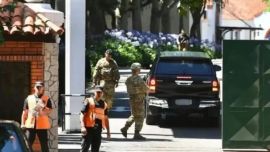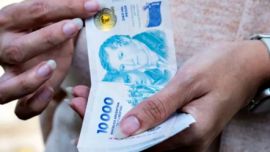For Dr. Felipe Michelini, working to ensure those who commit crimes against humanity face justice is personal.
He is the son of Uruguayan journalist and politician, Zelmar Michelini, one of the founders of Uruguay’s Frente Amplio (Broad Front) coalition, who was assassinated and found dead in Buenos Aires during the initial few months of Argentina’s last military dictatorship (1976-1983).
A lawyer by trade, Felipe has represented the Americas and Caribbean States on the board for the International Criminal Court’s Trust Fund for Victims since 2016. He also currently serves as an honorary member of Uruguay’s Working Group for Truth and Justice.
Michelini, a former congressman, comes from a big family. He remarks that himself and his nine siblings were very politically involved, and says while at university he began to get involved in student resistance movements. Once he moved to New York City to study at Columbia Law School, his career took an international turn.
INTERNATIONAL TURN
Today, he is dedicated to his work. The ICC’s Trust Fund for Victims operates on two basic mandates. The reparations mandate, as explained on the Fund’s website, allows the TFV to collect “fines or forfeitures from a convicted individual in a war crimes case, in order to provide reparations awards to victims.” The assistance part of the mandate allows for the TFV to work with affected communities, victims, and their relatives, without having to depend on their criminal proceedings.
Michelini specifically highlights the assistance mandate as “a very important innovation,” using Uganda to illustrate his argument. Prosecutors at the ICC at The Hague have sought to put Ugandan guerrilla commanders on trial atrocities committed by the Lord’s Resistance Army (LRA) insurgency group. Michelini says that the assistance mandate has “allowed the Trust Fund to be in Uganda for 20 years,” despite the ongoing nature of both ex-guerrilla commander Dominic Ongwen’s case and the fact that ex-LRA leader Joseph Kony is still in hiding.
Michelini and the TFV, whose responsibility he describes as “respond[ing] to the harm resulting from the crimes under the jurisdiction of the ICC, by ensuring the rights of victims and their families through the provision of reparations and assistance,” recently returned from a monitoring visit to Uganda to check up on the current TFV projects in the country and speak with victim survivors and affected communities.
“We had the urgent situation of poverty and very harsh living conditions, but with the impact of 10-15 years of war, it has impacted the whole country. The Lord’s Resistance Army that was led by Mr. Kony had incorporated such crimes as rape in a systematic way, and spread forced enlistment of children of a very [young] age and used them in combat. The kind of crimes we’re talking about are really serious,” he elaborated.
The TFV, working with national and international partners in the field, is working to have physical rehabilitation, psychological rehabilitation, and material support available for all victims of crimes against humanity.
CLOSER TO HOME
Quizzed about the TFV’s role in South America, Michelini specifies that the recent past of state terrorism in Uruguay, Argentina, and Chile do not come under the jurisdiction of the ICC because they took place before the Rome Statute, which established the ICC and the TFV.
The same applies to the conflicts of Nicaragua, El Salvador and Honduras.
“I will say,” Michelini exempted, “that can be the case with Colombia, with its ongoing investigation and with Venezuela.”
Michelini’s work in his home country is currently centred on the Working Group for Truth and Justice, an initiative started by President Tabaré Vázquez. The group, which brings together political and religious figures and victims, which has been found itself in the spotlight of late, following the recent withdrawal of the Mothers and Family Members of Detained Disappeared Uruguayans.
In a statement issued March 1, the Mothers and Family Members expressed frustration over the “immense and persistent work of asking and waiting” that they argue has not translated into real, useful information coming to light, citing the Armed Forces as “the principal obstacle in the search for the disappeared and for truth and justice” in their search for military intelligence.
“They’re not angry about the Working Group for Truth and Justice,” explains Michelini.
“They’re angry with the executive power of Uruguay and say that they wanted more commitment to force the military to talk and bring information. In that sense, they came to the conclusion that the results are not as good as they wanted them to be. And I kind of agree with that.”
Many Uruguayan military officials have made a pact where they do not confess or share the crimes they committed during the dictatorship, making the job of the Working Group doubly difficult in extracting useful information from the military, as well as having limited access to their records.
Michelini and the Working Group’s members met with President Vazquez shortly after the announcement by the Mothers and Family Members, to address their departure and the creation and integration of the Special Prosecutor for Crimes Against Humanity into the Group’s work, as Uruguay attempts to come to terms with its past.
But despite the challenges this work brings, Michelini is not disheartened. He finds comfort in the mission of both the Trust Fund and the Working Group.
“I think it’s the same topic, the struggle against the culture of impunity. The idea that there are crimes that cannot be committed. It’s hard work internationally and nationally,” said Michelini.
“It is a commitment on truth, justice, recollection, and reparation.”
























Comments